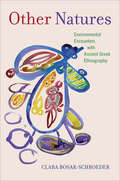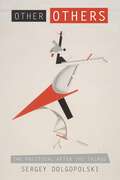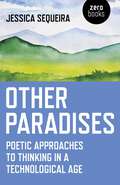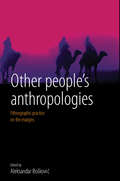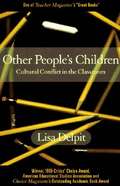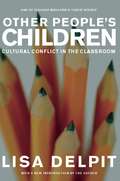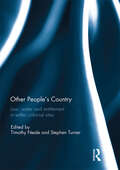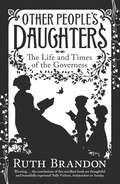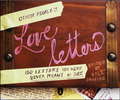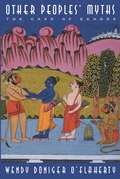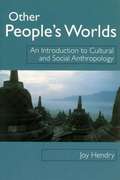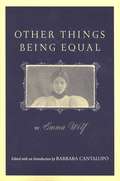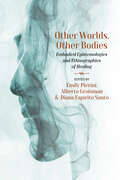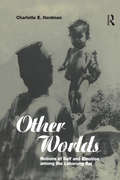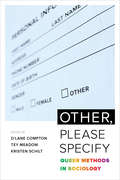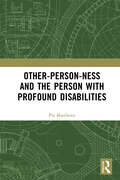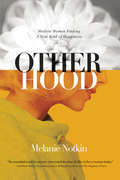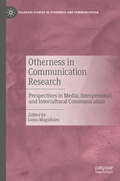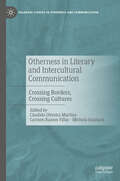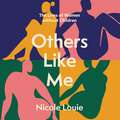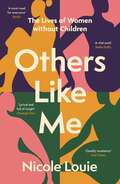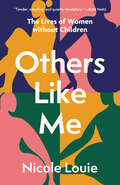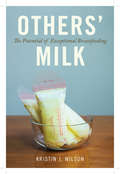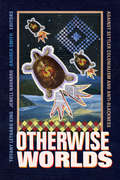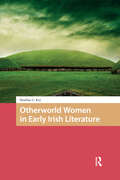- Table View
- List View
Other Natures: Environmental Encounters with Ancient Greek Ethnography
by Clara Bosak-SchroederAncient Greek ethnographies—descriptions of other peoples—provide unique resources for understanding ancient environmental thought and assumptions, as well as anxieties, about how humans relate to nature as a whole. In Other Natures, Clara Bosak-Schroeder examines the works of seminal authors such as Herodotus and Diodorus Siculus to persuasively demonstrate how non-Greek communities affected and were in turn deeply affected by their local animals, plants, climate, and landscape. She shows that these authors used ethnographies of non-Greek peoples to explore, question, and challenge how Greeks ate, procreated, nurtured, collaborated, accumulated, and consumed. In recuperating this important strain of ancient thought, Bosak-Schroeder makes it newly relevant to vital questions and ideas being posed in the environmental humanities today, arguing that human life and well-being are inextricable from the life and well-being of the nonhuman world. By turning to such ancient ethnographies, we can uncover important models for confronting environmental crisis.
Other Others: The Political after the Talmud
by Sergey DolgopolskiDenying recognition or even existence to certain others, while still tolerating diversity, stabilizes a political order; or does it? Revisiting this classical question of political theory, the book turns to the Talmud. That late ancient body of text and thought displays a new concept of the political, and thus a new take on the question of excluded others. Philosophy- and theology-driven approaches to the concept of the political have tacitly elided a concept of the political which the Talmud displays; yet, that elision becomes noticeable only by a methodical rereading of the pages of the Talmud through and despite the lens of contemporary competing theological and philosophical theories of the political. The book commits such rereading of the Talmud, which at the same time is a reconsideration of contemporary political theory. In that way, The Political intervenes both to the study of the Talmud and Jewish Thought in its aftermath, and to political theory in general.The question of the political for the excluded others, or for those who programmatically do not claim any “original” belonging to a particular territory comes at the forefront of analysis in the book. Other Others approaches this question by moving from a modern political figure of “Jew” as such an “other other” to the late ancient texts of the Talmud. The pages of the Talmud emerge in the book as a (dis)appearing display of the interpersonal rather than intersubjective political. The argument in the book arrives, at the end, to a demand to think earth anew, now beyond the notions of territory, land, nationalism or internationalism, or even beyond the notion of universe, that have defined the thinking of earth so far.
Other Paradises: Poetic Approaches to Thinking in a Technological Age
by Jessica SequeiraWhy do people choose to play with ideas considered antiquated? Why do they elect to act in non-productive ways? Perhaps the question can be asked in reverse: What comes to mind when we think of technology? That which is practical, efficient, invisible, fast, optimistic, constantly updated. So how can one explain the search for the opposite, that which is useless, inefficient, physically present, slow, dystopian, obsolete and governed by chance? The matter of what motivates the search for &‘antiquated&’ forms strikes deep into the heart of value. Are people simply following trends? Are they idiots? Are they sentimental? Are they artists? Are they interested in kitsch? Are they uninformed? Are they poets? Other Paradises is a collection of essays exploring imaginative responses to science and technology, and is about people who choose to build &‘other paradises&’, fully conscious of the alternative they offer to the dominant paradigm of technological progress.
Other People's Anthropologies: Ethnographic Practice on the Margins
by Aleksandar BoškovicAnthropological practice has been dominated by the so-called "great" traditions (Anglo-American, French, and German). However, processes of decolonization, along with critical interrogation of these dominant narratives, have led to greater visibility of what used to be seen as peripheral scholarship. With contributions from leading anthropologists and social scientists from different countries and anthropological traditions, this volume gives voice to scholars outside these "great" traditions. It shows the immense variety of methodologies, training, and approaches that scholars from these regions bring to anthropology and the social sciences in general, thus enriching the disciplines in important ways at an age marked by multiculturalism, globalization, and transnationalism.
Other People's Children: Cultural Conflict in the Classroom
by Lisa Delpit<P>In a radical analysis of contemporary classrooms, MacArthur Award-winning author Lisa Delpit develops ideas about ways teachers can be better "cultural transmitters" in the classroom, where prejudice, stereotypes, and cultural assumptions breed ineffective education. Delpit suggests that many academic problems attributed to children of color are actually the result of miscommunication, as primarily white teachers and "other people's children" struggle with the imbalance of power and the dynamics plaguing our system. <P>A new classic among educators, Other People's Children is a must-read for teachers, administrators, and parents striving to improve the quality of America's education system. <P>Winner of an American Educational Studies Association Critics' Choice Award and Choice Magazine's Outstanding Academic book award, and voted one of Teacher Magazine's "great books," Other People's Children has sold over 150,000 copies since its original hardcover publication. This anniversary paperback edition features a new introduction by Delpit as well as new framing essays by Herbert Kohl and Charles Payne.
Other People's Country: Law, Water and Entitlement in Settler Colonial Sites
by Stephen Turner Timothy NealeOther People’s Country thinks through the entangled objects of law – legislation, policies, institutions, treaties and so on – that ‘govern’ waters and that make bodies of water ‘lawful’ within settler colonial sites today. Informed by the theoretical interventions of cosmopolitics and political ecology, each opening up new approaches to questions of politics and ‘the political’, the chapters in this book locate these insights within material settler colonial ‘places’ rather than abstract structures of domination. A claim to water – whether by Indigenous peoples or settlers – is not simply a claim to a resource. It is a claim to knowledge and to the constitution of place and therefore, in the terms of Isabelle Stengers, to the continued constitution of the past, present and future of real worlds. Including contributions from the fields of anthropology, cultural studies, cultural geography, critical legal studies, and settler colonial studies, this collection not only engages with issues of law, water and entitlement in different national contexts – including Australia, Aotearoa/New Zealand, New Caledonia and the USA – but also from diverse disciplinary and institutional contexts. This book was originally published as a special issue of Settler Colonial Studies.
Other People's Daughters: The Life And Times Of The Governess
by Ruth BrandonA rich and fascinating account of the lives of Victorian governesses, exploring nineteenth-century attitudes to women, family and class.If a nineteenth century lady had neither a husband to support her nor money of her own, almost her only recourse was to live in someone else's household and educate their children - in particular, their daughters. Marooned within the confines of other people's lives, neither servants nor family members, governesses occupied an uncomfortable social limbo. And being poor and insignificant, their papers were mostly lost. But a few journals and letters have come down to us, giving a vivid record of what it was to be a lone professional woman at a time when such a creature officially did not exist.
Other People's Love Letters
by Bill ShapiroFevered notes scribbled on napkins after first dates. Titillating text messages. It's-not-you-it's-me relationship-enders. In Other People's Love Letters, Bill Shapiro has searched America's attics, closets, and cigar boxes and found actual letters-unflinchingly honest missives full of lust, provocation, guilt, and vulnerability-written only for a lover's eyes. Modern love, of course, is not all bliss, and in these pages you'll find the full range of a relationship, with its whispered promises as well as its heartache. But what at first appears to be a deliciously voyeuristic peek into other people's most passionate moments, will ultimately reawaken your own desires and tenderness...because when you read these letters, you'll find the heart you're looking into is actually your own.* "i think UR great. wanna have wine & Tequila again sometime?"* "I can't believe you're real, and I think about you constantly in some way or the other all day. I haven't given the finger to anyone driving since I met you."* "With you I learned how to fight cleaner, how to talk things out better, and how to make a strong loving family out of nothing. These are priceless gifts that I will carry with me the rest of my life. One more thing you did for me: you left, and I had to get through it."* "P.S. I look forward to your letters too much to call. Also, where do you stand on chains?"From the Hardcover edition.
Other People's Worlds: An Introduction to Cultural and Social Anthropology
by Joy HendryThe text is written primarily for students taking up the study of social anthropology.
Other Things Being Equal
by Emma Wolf Barbara CantalupoWidely regarded as a literary genius in her day, the Jewish American author Emma Wolf (1865-1932) wrote vivid stories that penetrated the struggles of women and people of faith, particularly Jews, at the turn of the twentieth century. This reissue of the 1916 revised edition of one of her most popular novels, Other Things Being Equal, first published in 1892, introduces Wolf to a new generation of readers, immersing them in an interfaith love story set in her native San Francisco in the late nineteenth century. The novel's protagonist, Ruth Levice, a young intellectual from an upper-class Jewish family, meets Dr. Herbert Kemp, a Unitarian, and falls in love. The novel's force lies in its unwillingness to adhere to ideological stands. A woman need not give up marriage and home to be strong, independent, and unconventional; a Jew does not have to be orthodox to remain close to her heritage and her faith.
Other Worlds, Other Bodies: Embodied Epistemologies and Ethnographies of Healing
by Emily Pierini, Alberto Groisman, and Diana Espírito SantoWhen approaching the multiplicity of the spiritual experiences of healing, ethnographers are often presented with ideas of the existence of “other” worlds that may intersect with the so-called “material” or “physical” worlds. This book proposes a sensory ethnography of healing with a focus on ethnographic knowing as embedded in an embodied epistemology of healing. Epistemological embodiment signals that personal scholarly experience of the “unknown”—be it in the form of trance, or as the embodiment of an “other”—shapes the concepts of healing, body, trance, self, and matter by which ethnographers craft out analysis.
Other Worlds: Notions of Self and Emotion among the Lohorung Rai
by Charlotte HardmanThis important ethnographic study explores the world-view of the Lohorung Rai, a hill tribe of about 3,000 members living in Eastern Nepal. These rice farmers have a tradition of migration combined with hunting and gathering. By examining Lohorung concepts and their discourse on self and emotion, this book explores the way in which ancestral influence dominates the daily lives and rituals of the Lohorung. It explores the ‘other world' of the Lohorung within which their concepts about the nature of the person and the natural world can be understood.This study will be relevant not only to Himalayan experts but to all anthropologists interested in culture, self and emotion.
Other, Please Specify: Queer Methods in Sociology
by Kristen Schilt D'Lane Compton Tey MeadowThis provocative collection showcases the work of emerging and established sociologists in the fields of sexuality and gender studies as they reflect on what it means to develop, practice, and teach queer methods. Located within the critical conversation about the possibilities and challenges of utilizing insights from humanistic queer epistemologies in social scientific research, Other, Please Specify presents to a new generation of researchers an array of experiences, insights, and approaches, revealing the power of investigations of the social world. With contributions from sociologists who have helped define queer studies and who use a range of interpretative and statistical methods, this volume offers methodological advice and practical strategies in research design and execution, all with the intent of getting queer research off the ground and building a collaborative community within this emerging subfield.
Other-person-ness and the Person with Profound Disabilities
by Pia MatthewsMany people think that profound disability presents us with a real problem, often because it seems difficult to connect with someone who does not seem to think or act like us. Positioning profound disability in this way immediately sets up a ‘them’ and ‘us’, where the person with profound disability becomes the problematic ‘other’. Attempts to bridge the ‘them’ and ‘us’ risk reducing everyone to the same where disability is not taken seriously.In contrast to a ‘them’ and ‘us’, and negative connotations of the other found in the existentialist philosophies of writers like Sartre and Beauvoir, Pia Matthews argues for a return to a positive view of the other. One positive approach to the other, based on an ethics of relationship as championed by Levinas, seems to mitigate the other-ness of profound disability. However, this still makes the person with profound disability dependent on the ethical concern of the more powerful other. Instead, this book argues for return to a personalist philosophy of being offered by Mounier, Marcel, and Wojtyła, and deepened by participation, belonging, and the possibility of contributing to the good of all. This deepened philosophy of being gives a more solid foundation for people who are especially at the mercy of others. It will be of interest to all scholars and students of disability studies, philosophy and anthropology.
Otherhood: Modern Women Finding A New Kind of Happiness
by Melanie NotkinMore American women are childless than ever before-nearly half those of childbearing age don't have children. While our society often assumes these women are "childfree by choice," that's not always true. In reality, many of them expected to marry and have children, but it simply hasn't happened. Wrongly judged as picky or career-obsessed, they make up the "Otherhood," a growing demographic that has gone without definition or visibility until now. In Otherhood, author Melanie Notkin reveals her own story as well as the honest, poignant, humorous, and occasionally heartbreaking stories of women in her generation-women who expected love, marriage, and parenthood, but instead found themselves facing a different reality. She addresses the reasons for this shift, the social and emotional impact it has on our collective culture, and how the "new normal" will affect our society in the decades to come.Notkin aims to reassure women that they are not alone and encourages them to find happiness and fulfillment no matter what the future holds. A groundbreaking exploration of an essential contemporary issue, Otherhood inspires thought-provoking conversation and gets at the heart of our cultural assumptions about single women and childlessness.
Otherness in Communication Research: Perspectives in Media, Interpersonal, and Intercultural Communication (Palgrave Studies in Otherness and Communication)
by Luisa MagalhaesThis book offers various perspectives from media studies, interpersonal communication, and intercultural communication on the experience and effects of being othered, excluded, and treated as less than. Its three sections cover: 1) expressions of otherness in everyday life, 2) experiences of otherness in media discourses and 3) strategies against otherness in social interaction. This book challenges the expression of otherness that is frequently related on texts of colonialism and of western social hegemonic characteristic of the Global North, therefore giving voice to perspectives from the Global South, in a pluralistic reading. The collection of contexts in which the expression of otherness is highlighted in this book, are presented in the perspective of the powerless other. As a receiver involved in a communicative process, the othered individual is approached in relation to his identitarian demonstrations, both in daily life, face-to-face and virtual contexts and in critical situations. These range from households to school and to media environments, therefore enhancing a thorough perspective on the phenomenon of othering in plural contexts.
Otherness in Literary and Intercultural Communication: Crossing Borders, Crossing Cultures (Palgrave Studies in Otherness and Communication)
by Cândido Oliveira Martins Carmen Ramos Villar Michela GrazianiLooking at both Lusophone literature and literatures from around the globe from the perspective of intercultural communication, this book addresses post-colonial literature, intercultural negotiations, and how multicultural debates are reflected in literary production. Topics addressed include mobility and its effects, be it through work, business, leisure, travel, or study; contact between countries, even within the boundaries of the country itself; migration or exile, be it by choice or by force. As a whole, the volume provides a comparative study of representations of intercultural communication in literature. The volume conceives literature broadly to include both traditional fictional and non-fictional prose, and more recent genres like social media posts
Others Like Me: The Lives of Women Without Children
by Nicole LouieA deeply personal exploration of childless and childfree women in their own words.Others Like Me is the story of fourteen women around the world, from different walks of life, who don't have children. It's also the story of why Nicole Louie had to find them and what they taught her. Part memoir, part exploration of childlessness through candid conversations, this book showcases the many ways in which people find fulfilment outside of parenthood. And because the social expectation to procreate weighs the most on women, Louie focuses solely on them, their experiences and how they flourish outside of motherhood. In doing so, she upends the stereotypes that diminish women who are not mothers and offers reassurance and companionship on a path less known.
Others Like Me: The Lives of Women Without Children
by Nicole LouieA deeply personal exploration of childless and childfree women in their own words.Others Like Me is the story of fourteen women around the world, from different walks of life, who don't have children. It's also the story of why Nicole Louie had to find them and what they taught her. Part memoir, part exploration of childlessness through candid conversations, this book showcases the many ways in which people find fulfilment outside of parenthood. And because the social expectation to procreate weighs the most on women, Louie focuses solely on them, their experiences and how they flourish outside of motherhood. In doing so, she upends the stereotypes that diminish women who are not mothers and offers reassurance and companionship on a path less known.
Others Like Me: The Lives of Women without Children
by Nicole LouieA deeply personal exploration of childless and childfree women in their own words. Others Like Me is the story of fourteen women around the world, from different walks of life, who don’t have children. It’s also the story of why Nicole Louie had to find these women and what they taught her. Part memoir, part exploration of childlessness through candid conversations, this book showcases the many ways in which people find fulfilment outside of parenthood. And because the social expectation to procreate weighs the most on women, Louie focuses solely on them, their experiences, and how they flourish outside of motherhood. In doing so, she upends the stereotypes that diminish women who are childless by choice, circumstance, or ambivalence and offers reassurance and companionship on a path less known.
Others' Milk: The Potential of Exceptional Breastfeeding
by Kristin J. WilsonBreastfeeding rarely conforms to the idealized Madonna-and-baby image seen in old artwork, now re-cast in celebrity breastfeeding photo spreads and pro-breastfeeding ad campaigns. The personal accounts in Others’ Milk illustrate just how messy and challenging and unpredictable it can be—an uncomfortable reality in the contemporary context of high-stakes motherhood in which “successful” breastfeeding proves one’s maternal mettle. Exceptional breastfeeders find creative ways to feed and care for their children—such as by inducing lactation, sharing milk, or exclusively pumping. They want to adhere to the societal ideal of giving them “the best” but sometimes have to face off with dogmatic authorities in order to do so. Kristin J. Wilson argues that while breastfeeding is never going to be the feasible choice for everyone, it should be accessible to anyone.
Otherwise Worlds: Against Settler Colonialism and Anti-Blackness (Black Outdoors: Innovations in the Poetics of Study)
by Andrea Smith Jenell Navarro Tiffany Lethabo KingThe contributors to Otherwise Worlds investigate the complex relationships between settler colonialism and anti-Blackness to explore the political possibilities that emerge from such inquiries. Pointing out that presumptions of solidarity, antagonism, or incommensurability between Black and Native communities are insufficient to understand the relationships between the groups, the volume's scholars, artists, and activists look to articulate new modes of living and organizing in the service of creating new futures. Among other topics, they examine the ontological status of Blackness and Indigeneity, possible forms of relationality between Black and Native communities, perspectives on Black and Indigenous sociality, and freeing the flesh from the constraints of violence and settler colonialism. Throughout the volume's essays, art, and interviews, the contributors carefully attend to alternative kinds of relationships between Black and Native communities that can lead toward liberation. In so doing, they critically point to the importance of Black and Indigenous conversations for formulating otherwise worlds.ContributorsMaile Arvin, Marcus Briggs-Cloud, J. Kameron Carter, Ashon Crawley, Denise Ferreira da Silva, Chris Finley, Hotvlkuce Harjo, Sandra Harvey, Chad B. Infante, Tiffany Lethabo King, Jenell Navarro, Lindsay Nixon, Kimberly Robertson, Jared Sexton, Andrea Smith, Cedric Sunray, Se’mana Thompson, Frank B. Wilderson
Otherworld Women in Early Irish Literature (The Early Medieval North Atlantic)
by Heather KeyIn early Ireland, there were many names for what scholars have dubbed the ‘Otherworld’: the Plain of Delights, the Land of Youth, the Land of Promise, and more. Many of the myths and legends from this period involve an encounter between a hero and a woman from this Otherworld, with sufficient frequency to form a distinct theme within the literature. This book examines the particularities and consequences of these otherworldly encounters, attending in particular to the question of gender and the social dynamics at work. Five stories purportedly from the lost book Cín Dromma Snechta receive detailed analysis, alongside material from other sources, in order to reconstruct the mindset of the early Irish who told these stories about the Otherworld and their views about women in general.
